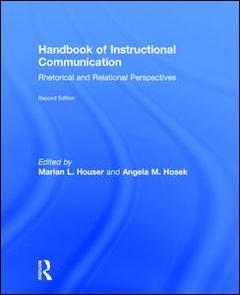Description
Handbook of Instructional Communication (2nd Ed.)
Rhetorical and Relational Perspectives
Coordinators: Houser Marian L, Hosek Angela
Language: English
Subjects for Handbook of Instructional Communication:
Keywords
Instructional Communication; Instructional Communication Scholars; scholars; Instructional Communication Research; Instructional Communication Research Practices; practices; Instructional Communication Researchers; Kristen LeBlanc Farris; Nonverbal Immediacy; Marian L; Houser; Affective Learning; Angela M; Hosek; CCP; Valerie Rubinsky; Instructional Communication Literature; Jordan Soliz; ERT; Joseph P; Mazer; Communication Apprehension; Scott A; Myers; Teacher Immediacy; Matthew M; Martin; Teacher Clarity; Ann B; Frymier; Public Speaking Anxiety; Alan K; Goodboy; Classroom Justice; San Bolkan; Instructional Context; Steven A; Beebe; Receiver Apprehension; Seth S; Frei; Social Robots; Virginia P; Richmond; Cognitive Learning; Rebecca M; Chory; Student Engagement; Sean M; Horan; Positive Emotional Valence; Brandi N; Frisby; Human Machine Communication; Marjorie M; Buckner; AR Technology; Scott Titsworth; Social Presence; Caroline Waldbuesser; Nonverbal Messages; Tina M; Harris; Mollie Murphy; Jimmie Manning; Danielle M; Stern; Rebecca Johnson; Autumn Edwards; Chad Edwards; Deanna D; Sellnow; Renee Kaufmann; Rebekah P; Crawford; Sally Vogl-Bauer; Derek R; Lane; T; Kody Frey; Nicholas T; Tatum; Kory Floyd; Tamara D; Afifi; Ariana F; Shahnazi; Deanna L; Fassett; Keith Nainby
Publication date: 08-2017
· 19.1x23.5 cm · Hardback
Publication date: 08-2017
· 19.1x23.5 cm · Paperback
Description
/li>Contents
/li>Readership
/li>Biography
/li>
The Handbook of Instructional Communication offers a comprehensive collection of theory and research focusing on the role and effects of communication in instructional environments. Now in its Second Edition, the handbook covers an up-to-date array of topics that includes social identity, technology, and civility and dissent. This volume demonstrates how to understand, plan, and conduct instructional communication research as well as consult with scholars across the communication discipline. Designed to address the challenges facing educators in traditional and nontraditional settings, this edition features a wealth of in-text resources, including directions for future research, suggested readings, and surveys for instructional assessment.
Table of Contents
Preface by Marian L. Houser & Angela M. Hosek
About the Authors
Chapter 1 - Historical Roots and Trajectories of Instructional Communication
By Kristen LeBlanc Farris, Marian L. Houser, Angela M. Hosek
Unit 1 – Introduction to The Rhetorical Perspectives of Instructional Communication
Introduction by Marian L. Houser & Angela M. Hosek
Chapter 2 - Instructor Message Variables
By Joe Mazer
Chapter 3 - Instructor Credibility.
By Scott A. Myers and Matt M. Martin
Chapter 4 - Student Participation and Engagement in the Classroom.
By Ann Bainbridge Frymier & Marian L. Houser
Chapter 5 - Instructional Dissent..
By Alan K. Goodboy & San Bolkan
Chapter 6 - Student Orientations toward Communicating in the Classroom.
By Steve A. Beebe & Seth S. Frei
Unit 2 – The Relational Perspective of Instructional Communication
Introduction by Marian L. Houser & Angela M. Hosek
Chapter 7 - Immediacy and the Teacher-Student Relationship.
By Virginia P. Richmond, Marian L. Houser, & Angela M. Hosek
Chapter 8 - [Re]Negotiating Power and Influence in the Classroom.
By Rebecca M. Chory & Sean M. Horan
Chapter 9 - Rapport in the Instructional Context.
By Brandi N. Frisby & Marjorie M. Buckner
Chapter 10 - Communication Perspectives on Classroom Emotion.
By Scott Titsworth & Caroline Waldbuesser
Unit 3 – Social Identity in the Instructional Environment
By Angela M. Hosek, Valerie Rubinsky & Jordan Soliz
Chapter 11 - Race/Ethnicity in the Classroom.
by Tina M. Harris & Mollie Murphy
Chapter 12 - Sexual and Gender Identity in the Classroom.
By Jimmie Manning, Danielle Stern, & Rebecca Johnson
Unit 4: Technology in the Instructional Environment
Introduction by Angela M. Hosek & Marian Houser
Chapter 13 - Human-Machine Communication in the Classroom.
By Autumn Edwards & Chad Edwards
Chapter 14 – Instructional Communication and the Online Learning Environment:
Then, Now, and Next.
By Deanna Sellnow & Renee Kaufmann
Unit 5 – Instructional Communication Approaches and Methods
Introduction by Angela M. Hosek & Marian L. Houser
Chapter 15 - Cognitive Approaches In the Instructional Context.
By Angela M. Hosek, Rebekah Crawford, Sally Vogl-Bauer
Chapter 16 – Affective Approaches in the Instructional Context.
By Derek R. Lane, T. Kody Frey, & Nicholas T. Tatum
Chapter 17 - Biological and Physiological Approaches in the Instructional Context.
By Kory Floyd & Tamara D. Afifi, & Ariana F. Shahnazi
Chapter 18 - Critical Communication Pedagogy.
By Deanna L. Fassett and Keith Nainby
Marian L. Houser(Ph.D., 2002, University of Tennessee-Knoxville) is a Professor in the Communication Studies Department at Texas State University. Her research focus is instructional communication and the student-teacher relationship in various contexts that include organizations, training, health campaigns, and interpersonal relationships. Dr. Houser was the recipient of the Texas State Presidential Award for Research and recently named an Eastern Communication Association Research Fellow (2016).
Angela M. Hosek(Ph.D., 2011, University of Nebraska, Lincoln) is an Assistant Professor and Basic Course Director in the School of Communication Studies at Ohio University. Her published research focuses on student-teacher relationships, social identity, privacy and discourse, social media and student success in the instructional context.




